5 books about Post, Ger
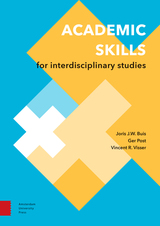
Academic Skills for Interdisciplinary Studies
Ger Post, Vincent Visser, and Joris Buis
Amsterdam University Press, 2016
Academic skills are the tools that enable you to gain, develop and critically discuss new knowledge during and after your Bachelor's and Master's programme. This handbook offers practical instructions, tips, and tricks that help undergraduate students to develop the skills needed for an interdisciplinary curriculum.
[more]
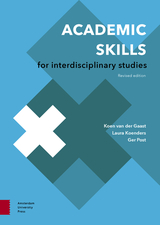
Academic Skills for Interdisciplinary Studies
Revised Edition
Koen van der Gaast
Amsterdam University Press, 2019
What’s a theoretical framework for? How do you effectively present your data in a figure? What’s the secret to a good presentation?As an interdisciplinary student, you delve into theories and research methodsfrom a whole range of disciplines. Academic skills are the tools that you can use to take in, develop, integrate and question knowledge. This guide provides specific instructions, tips and examples to help students develop these skills, both during and after their studies.As academic education focuses on research, the empirical cycle forms a keytheme of the book, including when discussing the following skills:- Searching for, critically reading and analysing scholarly texts- Formulating research questions- Making concepts measurable, qualitatively and quantitatively- Organizing literature and data- Analysing and formulating an argument- Academic writing- Collaborating- Reflecting- Presenting
[more]
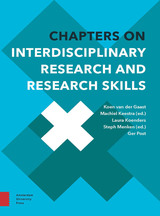
Chapters on Interdisciplinary Research and Research Skills
Koen van der Gaast
Amsterdam University Press, 2020
This book is a special edition, compiled for to the MSc Course Research Methodologies as taught at the Faculty of Aerospace Engineering at Delft University of Technology. It is a compilation of useful chapters from several sources on how to structure, set up, carry out and write up your (thesis) research to aid you in writing your research plan. Next to that it acts as a companion during your thesis research. After introducing you to the philosophy of scientific research, subsequent chapters each contribute to the different phases of your research. The book uniquely allows for the often multi- or interdisciplinary research many of you carry out, based on the established Dutch university tradition of (semi-)independent student research, creating a thread through the process for you to follow.
This edition is a collection of chapters from An Introduction to Interdisciplinary Research (2016), edited by Steph Menken and Machiel Keestra, and Academic Skills for Interdisciplinary Studies. Revised edition (2019), by Koen van der Gaast, Laura Koenders and Ger Post, published by Amsterdam University Press.
This edition is a collection of chapters from An Introduction to Interdisciplinary Research (2016), edited by Steph Menken and Machiel Keestra, and Academic Skills for Interdisciplinary Studies. Revised edition (2019), by Koen van der Gaast, Laura Koenders and Ger Post, published by Amsterdam University Press.
[more]
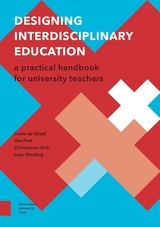
Designing Interdisciplinary Education
A Practical Handbook for University Teachers
Linda de Greef, Ger Post, Christianne Vink, and Lucy Wenting
Amsterdam University Press, 2017
Now, more than ever, higher education faces the challenge of educating students to see beyond the limits of their own discipline and to come up with innovative integrated solutions to our contemporary problems. Designing Interdisciplinary Education serves as a foothold for interdisciplinary initiatives in higher education, whether it be programmes, minors, courses or extra-curricular activities. It offers accessible guidance and practical advice for university teachers and curriculum leaders who aim to develop, implement and sustain a successful interdisciplinary approach to their teaching at the classroom, course or programme level.The book’s ‘how to’ approach addresses several important topics such as formulating and assessing interdisciplinary learning outcomes, embedding integration in the programme design, the features of an interdisciplinary teacher, interdisciplinary teaching in practice, and didactic methods that nurture interdisciplinary understanding. This handbook incorporates numerous case studies, key advices, and exercises from a variety of interdisciplinary programmes in diverse countries. The ideas elaborated in this handbook are based on the theories and practices used at the I0nstitute for Interdisciplinary Studies, the University of Amsterdam’s knowledge centre for interdisciplinary learning and teaching.
[more]
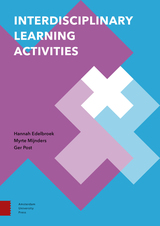
Interdisciplinary Learning Activities
Hannah Edelbroek, Myrte Mijnders, and Ger Post
Amsterdam University Press, 2018
As the complex societal and technological challenges of the 21st century cannot be addressed by solutions from just one field of expertise, academics are increasingly expected to cross the disciplinary boundaries. Interdisciplinary Learning Activities contains concrete suggestions in the form of examples of learning activities that university teachers can use to teach and foster interdisciplinary skills in graduate and undergraduate students. These skills for interdisciplinary understanding include critical thinking, collaboration, and reflection. Socratic style questioning, Breaking news, The Walt Disney strategy, and The interdisciplinary shuttle are just four examples of the 32 interdisciplinary learning activities for workshops, courses and curricula that are shared by university teachers in this handbook. Incorporating these activities into education will contribute to creating a challenging, engaging and successful learning environment.
[more]
READERS
Browse our collection.
PUBLISHERS
See BiblioVault's publisher services.
STUDENT SERVICES
Files for college accessibility offices.
UChicago Accessibility Resources
home | accessibility | search | about | contact us
BiblioVault ® 2001 - 2024
The University of Chicago Press









